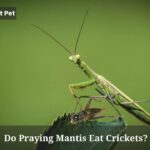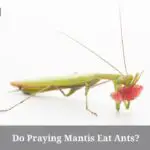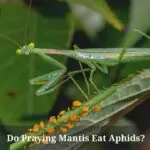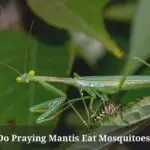Praying mantises are often spotted near places that are frequented by bees. This leads to a question on whether the praying mantises eat bees. Read on, to find out the answer.
Knowledge on whether praying mantises eat bees can be helpful in several situations.
Do praying mantis eat bees? If, for instance, you keep pet praying mantises, you will want to know whether feeding them on bees is viable.
In another case, you may have a problem of bees buzzing around your space too much. Then you may want to know whether praying mantises can help in the biological control of the nuisance bees.
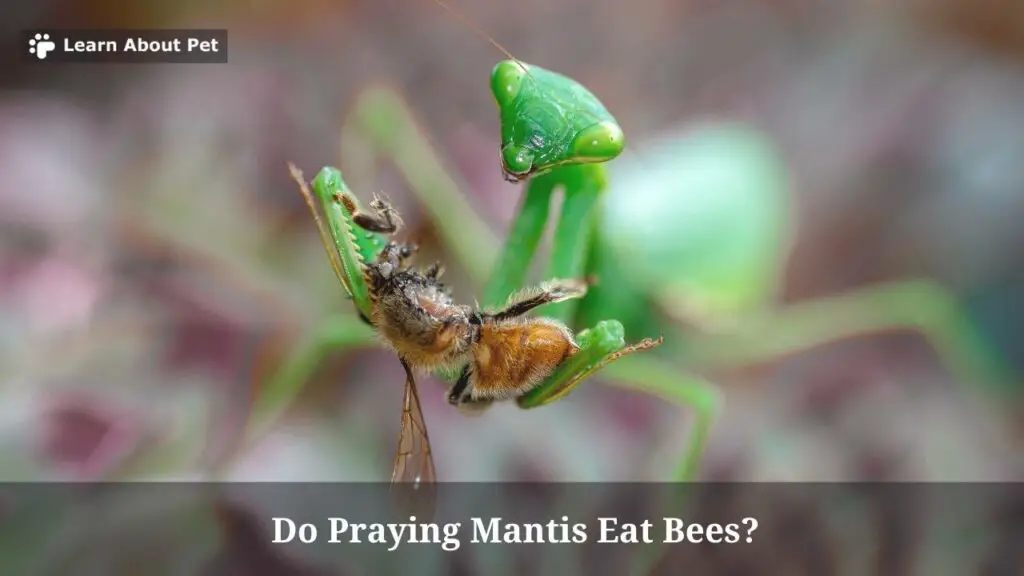
And in yet another situation, you may be a person who keeps bees – like say, honey bees. Then you may want to know if the praying mantises you see hovering around your hives are a potential hazard to your bees…
So in all these sorts of situations, the core underlying question is, will praying mantis eat bees?
And clearly, it makes sense for us to start by finding out whether praying mantis are capable of eating bees.
Can Praying Mantis Eat Bees?
Yes, praying mantis are capable of eating bees.
As noted earlier, praying mantises tend to be common visitors to areas that are frequented by bees. They visit such areas with the objective of preying on the bees.
Bees actually seem to be among the more preferable foods for praying mantises.
Very many people have witnessed praying mantises eating bees.
So, yes, praying mantis can eat bees.
How Do Praying Mantis Eat Bees?
So far, we have learnt that praying mantis do eat bees. Yet, as we all know, bees are quite fierce insects. So the next logical question is on how does praying mantis eat bees, considering the bees’ fierceness?
To make sense of this phenomenon (in which praying mantis eat bees), one needs to know the exact method the mantises use in hunting for and eating the bees.
How do praying mantis eat bees? The praying mantis eat bees when they are alive: by ambushing them (thanks mainly to the mantis camouflage) and using the spikes on their front legs to pin them down. Then they proceed to devour them almost whole, using their mouthparts.
So, in a nutshell, that is how praying mantis eat bees.
Which Types Of Bees Do Praying Mantis Eat?
Now that we have understood how praying mantis eat bees, the next relevant question is on which types of bees the mantises eat.
Do mantis eat bees of all types? Or are there specific types of bees that the mantis eat? One could even ask, do praying mantis eat bees and wasps? Or is it just the bees?
Now in answering that question, we will focus on whether the mantises eat live bees, dead bees, bumble bees and honey bees in turn.
Do Praying Mantis Eat Live Bees?
Praying mantis do eat live bees. In their hunting missions, praying mantises focus on finding live bees.
When the mantis find live bees, they ambush them, pin them down and proceed to eat them whole. So, yes, they mantis eat live bees.
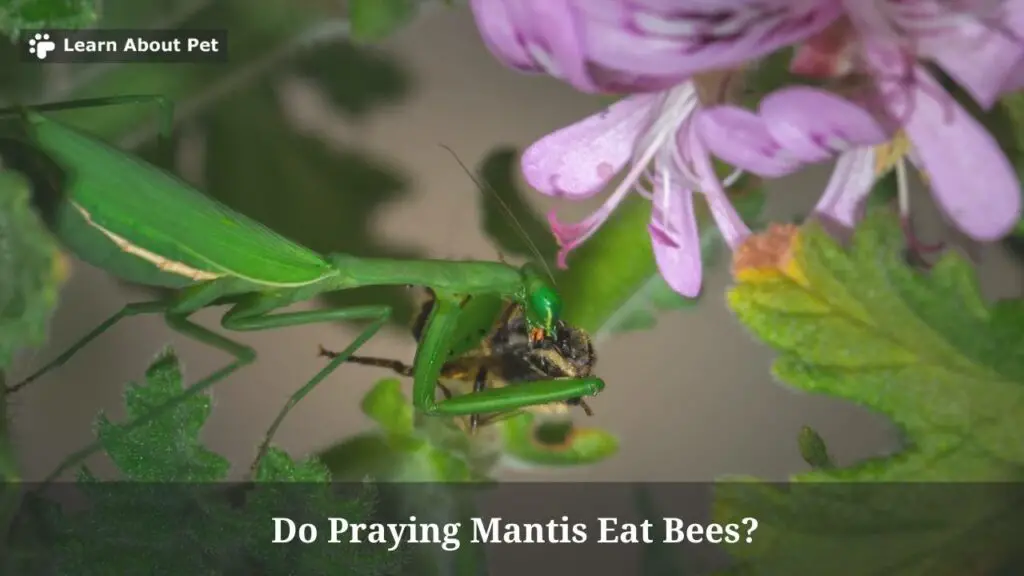
Do Praying Mantis Eat Dead Bees?
If you keep pet praying mantises, and you find dead bees somewhere, you may consider picking them and offering them as food to your mantises. But do praying mantises eat bees that are dead?
No. Praying mantis usually don’t eat dead bees. In fact, they normally don’t eat any prey that they find already meat. They prefer to kill their prey themselves, before proceeding to devour it.
So praying mantises don’t eat dead bees.
Do Praying Mantis Eat Honey Bees?
Praying mantis do eat honey bees.
It is very common to find praying mantis hanging around areas where honey bees come for nectar and other resources.
So praying mantises do eat honey bees. This means that if you do keep honey bees, you should view any praying mantis hovering around them as predators.
Do Praying Mantis Eat Bumble Bees?
Praying mantis do eat bumble bees.
In fact, it would seem that bumble bees are among the mantises’ favorite foods.
Can I Feed Bees To Praying Mantis?
If you do find live bees, then it may be viable to offer them as food to your praying mantis.
The question you may be asking yourself in this context is, do praying mantis like bees as food? And the answer is mostly ‘yes’, considering the lengths to which they go while hunting for bees in nature.
One may then wonder, can praying mantis eat bees daily? And the answer is that this wouldn’t be advisable: as it is best to offer pet mantises a varied diet.
Even for the occasional feeding of praying mantis on bees, you still need to avoid overfeeding.
You thus need to make an effort to know how many bees can a praying mantis eat, and how much is too much bees for praying mantis.
Final Verdict – Do Praying Mantis Eat Bees
Praying mantis do eat bees. When you find praying mantis hovering around spots that bees tend to visit regularly, you need to know that the mantises are actually hunting for the bees.
Relying on their camouflage, the praying mantises are able to slyly ambush the bees. Then using their front leg spikes, they pin down the bees. And finally they devour them (almost whole) using their mouthparts.
Praying mantis usually only eat live bees, not dead bees.
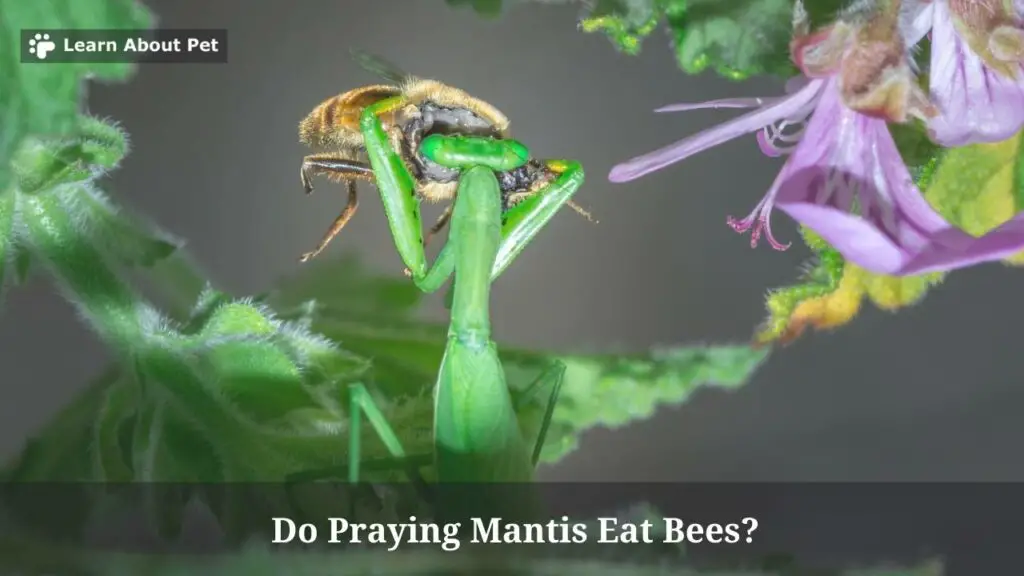
For people who keep bees (like, say, honey bee keepers), praying mantis can be harmful predators.
But for people for whom bees have become a nuisance, praying mantis can be a means for biological pest control.
If you keep a pet mantis, the option of offering it bees as food is viable. That is provided you can find a steady supply of live bees for the mantis to feed on.
As a pet lover, make sure to learn about pet more and give your pet mantis a good and comfortable life!

Welcome to Learn About Pet. My name is Rajkumar Ravichandran and I love all pets, travel, and amazing food. I write about my passion and personal experience caring for multiple pets in this blog! ❤️
Post Disclaimer
DISCLAIMER: THIS BLOG OR WEBSITE, "Learn About Pet", DOES NOT PROVIDE YOU WITH MEDICAL ADVICE AND IS NOT A SUBSTITUTE FOR MEDICAL ADVICE. ALWAYS GET IN TOUCH WITH YOUR PERSONAL VETERINARIAN AND USE INFORMATION HERE AS GENERAL ADVICE.
The information, including but not limited to, text, graphics, images and other material contained on this website are for informational purposes only. No material on this site is intended to be a substitute for professional veterinary advice, food recommendation, diagnosis, or treatment. Always seek the advice of your veterinarian or other qualified health care provider with any questions you may have regarding a medical condition or for pet food related questions.
